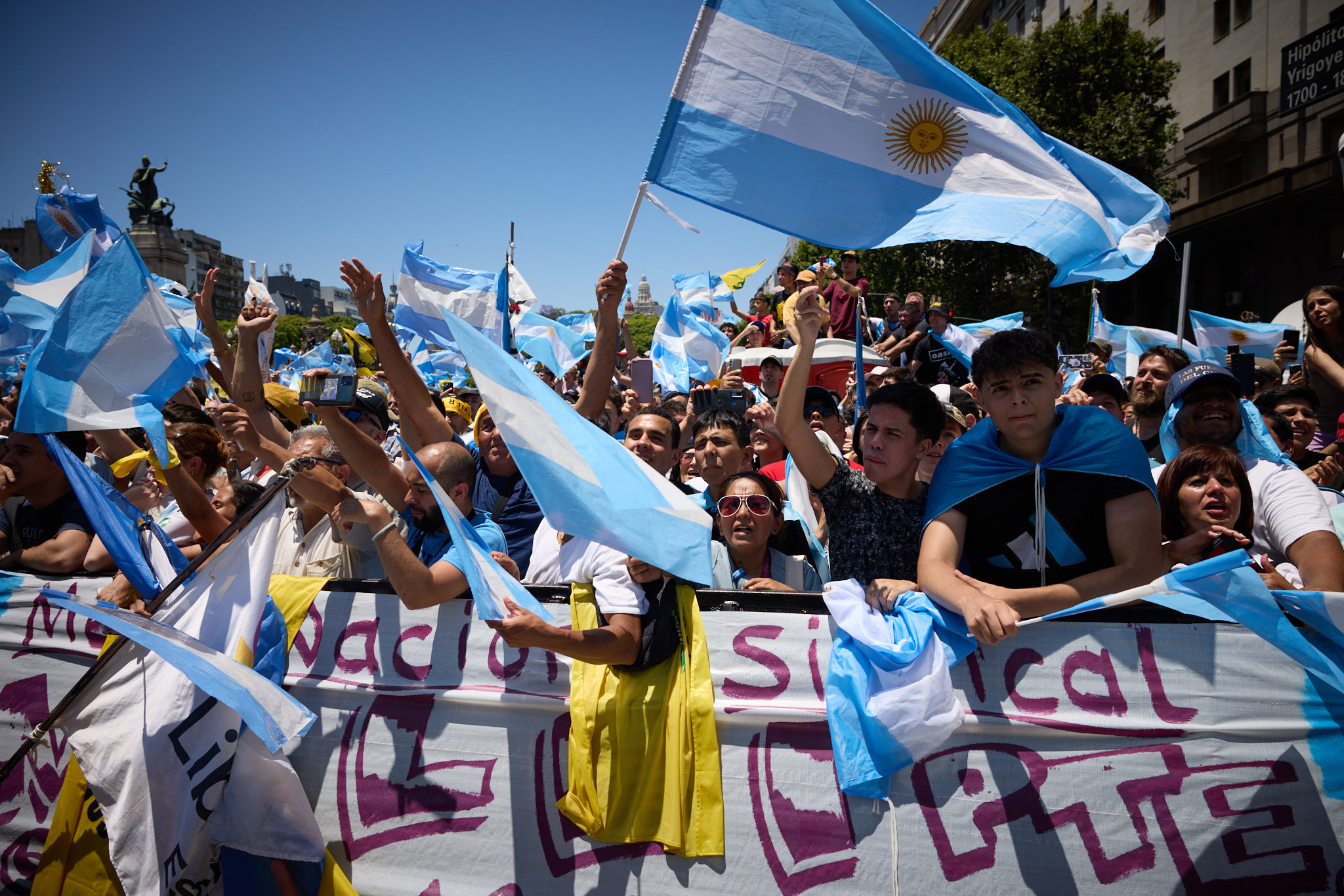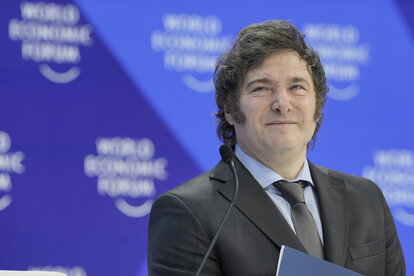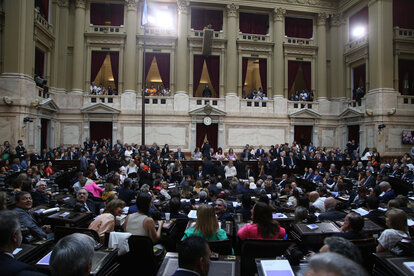Argentina
Argentina ahead of general strike on 24 January - What's next?

The general strike on 24 January will be an important indicator of how much support Milei still has among the majority of the population
© picture alliance / SvenSimon-ThePresidentialOfficeU | Presidential Office of UkraineSince taking office as Argentina's new president on 10 December, Javier Milei has already experienced two records.
Firstly, inflation rose sharply by another 25.5% in December. The increase in basic food, such as maize, rice and citrus fruit, was even higher, in some cases exceeding 50%. At 211.4%, inflation in 2023 as a whole was the highest in the world, surpassing even Venezuela.
On the other hand, the trade unions announced a general strike for 24 January, the fastest ever experienced by a president in the history of Argentina.
Milei can blame the further rise in inflation on the disastrous economic legacy inherited from the previous Peronist government, including the catch-up effects of prices, for example for food, energy and transport, which were kept artificially low by the previous economy minister and Peronist rival candidate, Sergio Massa, before the presidential elections in November.

Javier Milei: President of Argentina since 10 December 2023
© picture alliance / ASSOCIATED PRESS | Markus SchreiberControversial emergency decree
The general strike by the trade unions, which is supported by the Peronists, is explicitly directed against the legislative initiatives presented by Milei in the omnibus legislation and the emergency decree DNU ("Decreto de Necesidad y Urgencia"). Milei's aim here is to use his advantage in office as the clear winner of the presidential elections to initiate all the changes in economic, labour market, social and legal policy that he believes will put Argentina on a path to growth and renewal in the short term with a kind of "shock therapy", thereby dispensing with setting priorities, for example in the form of a 10-point plan. While an emergency decree by a newly elected president is not unusual in Argentina, it is the far-reaching scope of around 300 measures that Milei is aiming for.
Trade unions and the Peronists close to them criticise the scope of the economic measures, for example the (gradual) reduction of subsidies for energy and transport and the cuts in labour market legislation, such as the reduction of jobs in the public sector for employees with less than one year's service and the extension of the probationary period from three to eight months.
The general need for reforms is recognised by the majority of the population, but there is concern about the specific financial impact of the planned cuts and price increases - especially in view of the already high inflation and difficult economic situation. There is also resistance to unorthodox measures by Security Minister Patricia Bullrich, who wants to apply the costs-by-cause principle to demonstrations: she recently sent invoices to the trade unions organising the previous mass demonstrations for the reimbursement of police costs and threatened to cut the social benefits of violent demonstrators.
However, criticism has not only come from the trade unions and the Peronist camp, which was to be expected given the main focus of the reform package, but also from the courts. For example, two labour courts have already denied the urgency of labour market policy reform measures because, in their opinion, they did not serve to combat an economic emergency and therefore can not be dealt with as part of a presidential emergency decree, but rather as structural reforms are to be discussed in an orderly parliamentary procedure.
Dispute with Congress
On the other hand, criticism of the government's legislative package is also being voiced in Congress beyond the Peronist opposition among the bourgeois forces, on whose support Milei is dependent due to the lack of its own majorities in both chambers. Congress can reject the decree with majorities in both chambers. If only one of the two chambers votes in favour, the decree is valid, as is the case if it is not dealt with by one chamber. In the meantime, a decree remains in force. There have also been cases in Argentinian history in which the Supreme Court has declared decrees invalid because it was of the opinion that there was no real urgency.
The liberal "grand seigneur" in Congress and former Minister of Economy Ricardo López Murphy criticised the short consultation period in Congress until just the end of January and instead called for a more extensive parliamentary debate until at least the end of February - both in an effort to achieve broader parliamentary support and in view of the enormous scope of the legislative package.
Milei, whose relationship with Congress has been difficult from the outset (he gave his inauguration speech symbolically in front of Congress with his back to the building instead of in the Congress building itself, as has been customary up to now), is relying on an "all or nothing" policy with Congress and the threat that a rejection of the reform package now would only require even more severe cuts in the future. In doing so, he wants to prevent a watering down of the overall package in a lengthy parliamentary consultation process at all costs. He is staunchly defending his plan - including by making drastic comments about political opponents - as the only true course, which is not without risk. In doing so, he risks a far-reaching confrontation with Congress. He is using his clear election victory as an argument to threaten Congress with holding a referendum on his reform package in the absence of congressional approval and, if necessary, declaring a state of emergency to enforce his decree. In view of the deep divisions in the Argentinian population that became clear during the election campaign between Peronists on the one hand and Milei's supporters who (so far) favour a fresh start on the other, as well as the current deteriorating economic situation, the outcome of a possible referendum would be uncertain amid the threat of a heated atmosphere. The latest polls (Poliarquía Consultores) show a contradictory picture: at 63%, the Argentinian population's approval rating for Milei is significantly higher than that of the Peronist leaders, for example the governor of Buenos Aires province, Axel Kicillof (34% in favour) and the current vice president Christina Kirchner (25%). At the same time, however, a majority of 59% rejects Milei's reform package.
Milei refuses to discuss his reform package in principle in Congress and only offers to consider proposed amendments. By adopting this knee-jerk political style, Milei risks losing the support of politicians in the centre-right camp who broadly support his course and measures.

President Milei's new Argentinian government has initiated radical changes to the economy and administration.
© picture alliance / AA | Mariano Gabriel SanchezInitial concessions from Milei
On a positive note, the Milei government has already announced at least a few changes to the original legislative package and has - somewhat - accommodated its critics in terms of content. For example, he has agreed to shorten the duration of the state of emergency for the enforcement of the decree to one year if necessary (instead of the two years he originally claimed, with an option to extend it to his entire term of office). Some of the less practicable measures originally planned were also withdrawn, such as the restriction on freedom of assembly for groups of three or more people, which would have implied that even a family outing required authorisation.
With regard to the announced general strike on 24 January, the really interesting factor will be the extent to which this will find massive support not only among the organised "professional demonstrators", but also among the wider population, or whether the majority of the population is prepared to trust Milei's promise that his reform package offers hope for light at the end of the tunnel and that the economic situation will improve in the course of the year.
Difficult economic outlook, but first rays of hope
The decisive factor for an improvement in the economic situation will not only be that inflation falls - after a further rise expected by March, in particular due to the gradual abandonment of price controls - but also that Argentina returns to positive economic growth this year after a 2.5% decline in GDP in 2023 and that domestic and foreign investment increases. In addition to securing domestic support in politics and society, it is therefore of key importance for Milei to promote his reform course abroad and build trust in Argentina's stability under his leadership. On the one hand, his vocal positions in favour of Ukraine (President Zelensky travelled especially for Milei's inauguration on 10 December, his first trip to Latin America since Russia's attack on Ukraine) and in favour of Israel on the occasion of the 100 day memorial since the beginning of the attacks by the Hamas underlined this clear stance. On the other hand, Milei travelled to the World Economic Forum in Davos this week, accompanied by Economy Minister Luis Caputo, among others, to meet with top foreign politicians and business representatives in around 60 bilateral meetings, in addition to delivering a pointed economic keynote speech on "market or state", in order to promote closer cooperation with the West and private investment in the key sectors of energy, raw materials and infrastructure in Argentina. This offers attractive opportunities both for the West to secure the resources it needs (e.g. rare earths) and to diversify procurement and sales markets in order to reduce its dependence on business with China, as well as for Argentina itself to compensate for its own financing bottlenecks in the infrastructure sector (or as Milei has already formulated it as a viral YouTube classic: "No hay plata" - "There is no money") and thus enable investment, jobs and economic recovery in the country.
The first important economic policy milestone for Milei was an agreement reached with the IMF last week. The government was able to negotiate that the IMF would give the country a new chance to fulfil the conditions for the 44 billion dollar loan programme which had already been agreed with the previous Peronist government but repeatedly broken. The agreement was positively received by the international financial markets and also halted (at least for the time being) a further devaluation of the peso against the dollar. Milei and the IMF are therefore in a honeymoon phase, which still has to stand up to the practical test of a successful longer-term relationship.
Government race
Milei is in a race between securing sufficient political and popular support for his reform programme and the need to show visible initial improvements and successes for the population soon. The general strike on 24 January will be an important indicator to see how much support Milei still has among the majority of the population and whether he can gain further momentum for his ambitious reform course or whether he will have to prepare for increased headwinds.
